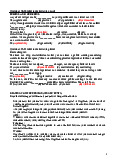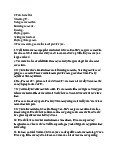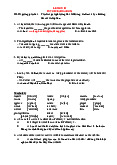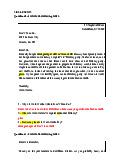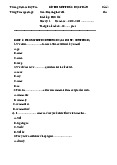



















Preview text:
TRƯỜNG ĐẠI HỌC DUY TÂN KHOA NGOẠI NGỮ
BỘ MÔN: ANH VĂN KHÔNG CHUYÊN GIÁO TRÌNH READING LEVEL 2 LƯU HÀNH NỘI BỘ Đà Nẵng, 2014 TABLE OF CONTENTS Page CHAPTER 1 - GRAMMAR 3 OVERVIEW: AGREEMENT
................................................................. 4
LESSON 1: Subject – Verb Agreement in Numbers (1) .…………………………………… 5
LESSON 2: Subject – Verb Agreement in Numbers (2) …………………………………… 7
LESSON 3: Subject – Verb Agreement in Numbers (3) …………………………………… 9 LESSON 4: Agreement Tense
…………………………………………… 12 LESSON 5: Review
…………………………………………… 14
CHAPTER 2 – VOCABULARY
…………………………………………… 18 LESSON 6: Adjectives (1)
…………………………………………… 20 LESSON 7: Adjectives (2)
…………………………………………… 23 LESSON 8: Adverbs (1)
…………………………………………… 25 LESSON 9: Adverbs (2)
…………………………………………… 29 LESSON 10: Review
…………………………………………… 32
CHAPTER 3 – READING POINT
…………………………………………… 37 LESSON 11: Letters and E-mails
…………………………………………………… 38 LESSON 12: Advertisements
…………………………………………… 43
LESSON 13: Notices / Announcements …………………………………………………… 49 LESSON 14: Articles / Reviews
…………………………………………… 55 LESSON 15: Memorandums
…………………………………………… 62 2 Further exercises CHAPTER 1 GRAMMAR 3 OVERVIEW Agreement
Agreement means that a subject and its verb must agree with each other in number (singular
or plural), or the tenses in the main clause and subordinate clause must agree with each other.
Basic rules of subject-verb agreement in number:
A singular subject takes a singular verb, while a plural subject takes a plural verb.
When the subject is an indefinite pronoun or a noun with a quantifier, carefully
decide whether you should use a singular or a plural verb.
When the subjects in a sentence are joined by conjunctions, a singular or plural
verb may be used depending on each particular conjunction. The computer is Printers are Each report is
Many companies are Either or you he is
Neither you nor I am
Agreement in tense Of main clause and subordinate clause:
When the main clause is in the present tenses, the subordinate clause may be in various tenses.
When the main clause is in the past tense, the subordinate clause may be in the past tenses 4 lesson 1
Subject-Verb Agreement in Number (1) (Singular / Plural Nouns)
Singular subject - singular verb, plural subject - plural verb
The basic rule is that a singular subject goes with a singular verb, while a plural
subject goes with a plural verb. Besides, you must use singular verbs in the following cases:
When the subject is an uncountable noun
When the subject is a gerund or a to-infinitive
When the subject is a noun clause introduced by that
Types of SubjectsExamplesSingular/plural nounThe president is not in now
Companies want to increase their profitsUncountable nounsThe information about the
last quarter is in the document.Gerunds or to-infinitivesGoing on a business trip is sometimes hard
To conduct customer surveys is necessaryNoun clauses introduced by thatThat the
company went bankrupt was unexpected. Confusing singular nouns
There are some nouns ending in -s, but they are actually singular nouns.
NounsExamplesNoun indicating subjectseconomics politics statistics,
mathematicsPronounsTimes Charles WalesEconomics is not easy to understand.
The news was so surprising.
A. Read the following sentences. Mark in the space given if the underlined word is
correct and correct the incorrect one. 1.
Developing new product designs are essential. ________________is 2.
The CEO plans to open another branch. ________________ 3.
That she will get a promotion are shocking. __________is________ 4.
My coworkers think that I will quit soon. ________________ 5.
The accountant says that statistics are very difficult for him.____is___________
B. Look at the underlined parts and choose the correct option to complete each sentence. 5
1. Going on a business trip three times a month ________ too frequent. A were C a D is B be re
2. The displayed furniture ________ not for sale. A has C is D a B have re 6 PRACTICE
I. Choose one correct option in the parentheses.
1. Holding the conference in our hotel (are advantageous to your company , is) .
2. The requested document (has, have) not yet arrived.
3. Access to this file (are, is) limited to authorized personnel.
4. Each report (contains, contain) information on key economic indicators.
5. That Mr. Smith was absent from work (were, was) surprising.
6. The editor (want, wants) to change the layout of the newspaper.
II. Choose the correct option for each of the following sentences.
7. The firm …………. profit increases with the new marketing strategy. A anticipates C are anticipated B anticipate D anticipating
8. Obtaining a good job…………. difficult due to the economic situation. A have remained C remain B are remaining D remains
9. This chemical …………. only approved for use in animal foods. A was B were C has D have
10. Every area manager …………. required to visit all the offices under his management once a week. A is B are C were D have lesson 2
Subject-Verb Agreement in Number (2)
(Indefinite Pronouns and Nouns with a Quantifier) Indefinite pronouns
one each either neither no one / nobody nothing something someone /
somebody anyone / anybody anything everyone / everybody everything+ singular verb
Neither of the + plural noun can be followed by a plural verb.both many sever (a)few+ plural verb One of the employees called in sick. has
Many firms are now hiring lawyers. Nouns with a quantifier
all/ most/ some /lots/ halfof the + singular/uncountable noun+ singular verbof the
+ plural noun+ plural verbthe numberof a plural noun+ singular verba number+ plural verb
All of the profit goes to the charities. All of the members to attend the seminar have .
A. Fill the gaps with the correct forms of the verbs given in brackets.
1. (look) A few proposals ________ excellent. look
2. (be) Some of the facilities ____are____ open at this time.
3. (be) Several sales managers ____were____ happy with the decision at yesterday's seminar.
4. (have) Each of the managers ____has____ different characteristics.
5. (have) I am sure that someone _____has___ a copy of the report.
6. (be) Many of the important documents in the cabinet ___are_____ missing now Be ( is/ am / are)
B. Look at the hints given and choose the correct option to complete each sentence. 1. A
number of people ________ been laid off in the last two years. A have B has C had D will have 2. Most of the
information ________ not reliable. A were B was C are D being PRACTICE PART 1
I. Choose one correct option in the parentheses.
1. All of the old magazines (is, are) available at a discounted price.
2. Some of the executives (refuse, refuses) to reduce expenditures on advertising.
3. The competition between low-cost airlines (has, have) increased.
4. Senior employees in the workplace (know, knows) less about computers.
II. Choose the correct option for each of the following sentences.
5. The rest of the guests for the Best Employee Award…………. to arrive after 7:00 p.m. A expects C are expected B expecting D is expected
6. Some of the pens in the shipment …………. faulty parts and cannot be used. A has B is C was D have PART 2
I. Choose one correct option in the parentheses.
1. The applicants (have, has) plenty of experience in foreign trade.
2. Many offices (instruct, instructs) employees about what to do in case of fire.
3. The survey forms (was, were) not filled out completely.
4. The headquarters and the branch office (plan, plans) to reorganize some divisions.
5. A few reports (provides, provide) accurate data on the current market.
6. Our facilities (are, is) available for family and company events every weekend.
II. Choose the correct option for each of the following sentences.
7. The company and the striking workers …………. to a settlement. A has agreed B agrees C have agreed D agreeing
8. The cell phone charges for local calls …………. discounted for the first month. A has B was C is D are
9. The government …………. taking significant measures to promote the export of domestic goods. A been B is C have D has
10. Several candidates …………. at least two foreign languages fluently. A speak B speaks Chas spoken D was spoken Lesson 3
Subject-Verb Agreement in Number (3) (Conjunctions)
Coordinating conjunctions and & or
When the subjects in a sentence are joined by the conjunction and, a plural verb
is commonly used. When the subjects are joined by the conjunction or, their verb
must agree with the subject nearest to it.
The CEO and the manager are having a meeting now.
Three workers or one supervisor to work on Saturdays. has Correlative conjunctions
When the two subjects in a sentence are joined by correlative conjunctions, their
verb mostly takes the number of the subject nearest to it. In the following
structures, the verb will agree with the subject B.
Either A or BNeither A nor BEither you or he needs to fill out this form.Not A but
BNeither he nor she is not coming to the seminar.Not only A but (also) BNot only you
but also Mr. Brown is responsible for the matter.B as well as A
A. Read the following sentences and correct the underlined parts in the space provided.
1. Jacky and Sam has agreed to extend the contract. __have______
2. Neither she nor I commutes to work by subway. ___commute_____
3. He or you is expected to do the presentation. ________ are
4. His education and his work experience is suitable for this job. ________ are
5. Either you or your boss have to take responsibility. _______ has
6. Not only English but also French are necessary to do the job. ________ is
B. Look at the hints given and choose the correct option to complete each sentence.
1. The auditorium as well as the libraries ________ being renovated. A is B a C h D has re ave 2. The directors
and the sales representatives ________ on a business trip every month. A B C D going goes go is going PRACTICE
I. Choose the correct option for each of the following sentences.
1. The piano as well as the pipe organ …………. to be tuned for the big concert. A has B have
2. The mayor together with his two brothers …………. going to be indicted for accepting bribes. A are B is
3. Neither of my two suitcases …………. adequate for this trip. A is B are
4. There …………. a list of committee members on the head-table. A are B is
5. Everybody in the class …………. done the homework well in advance. A has B have
6. The jury …………. their seats in the courtroom. A take B takes
7. Neither the teacher nor the students …………. to understand this assignment. A seem B seems
8. …………. either my father or my brothers made a down-payment on the house? A has B have
9. Hartford is one of those cities that …………. working hard to reclaim a riverfront. A is B are
10. Some of the grain …………. gone bad. A have B has
11. John or his brother …………. going to be responsible for this. A are B is
12. A few of the students …………. doing so well they can skip the next course. A are B is
13. Either the committee on course design or the committee on college operations …………. these matters. A decide B decides
14. One of my instructors …………. written a letter of recommendation for me. A have B has
II. Choose the correct form of the verb that agrees with the subject.
1. Annie and her brothers (is, are) at school.
2. Either my mother or my father (is, are) coming to the meeting.
3. The dog or the cats (is, are) outside.
4. Either my shoes or your coat (is, are) always on the floor.
5. George and Tamara (doesn't, don't) want to see that movie.
6. Benito (doesn't, don't) know the answer.
7. One of my sisters (is, are) going on a trip to France.
8. The man with all the birds (live, lives) on my street.
9. The movie, including all the previews, (take, ) about two hours to watch. takes
10. The players, as well as the captain, (want, wants) to win.
11. Either answer (is, are) acceptable.
12. Every one of those books (is, are) fiction.
13. Nobody (know, knows) the trouble I've seen.
14. (Is, Are) the news on at five or six? 15. Mathematics are) John's favorite subject (is,
, while Civics (is, are) Andrea's favorite subject.
16. Eight dollars (is, are) the price of a movie these days.
17. (Is, Are) the tweezers in this drawer?
18. Your pants (is, are) at the cleaner's.
19. There (was, were) fifteen candies in that bag. Now there (is, are) only one left!
20. The committee (debates, debate) these questions carefully.
21. The committee (leads, lead) very different lives in private.
22. The Prime Minister, together with his wife, (greets, greet) the press cordially.
23. All of the CDs, even the scratched one, (is, are) in this case.
